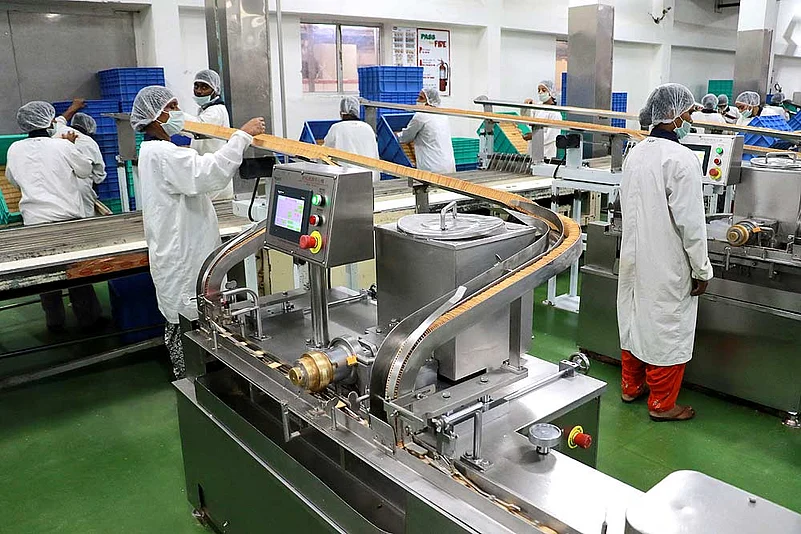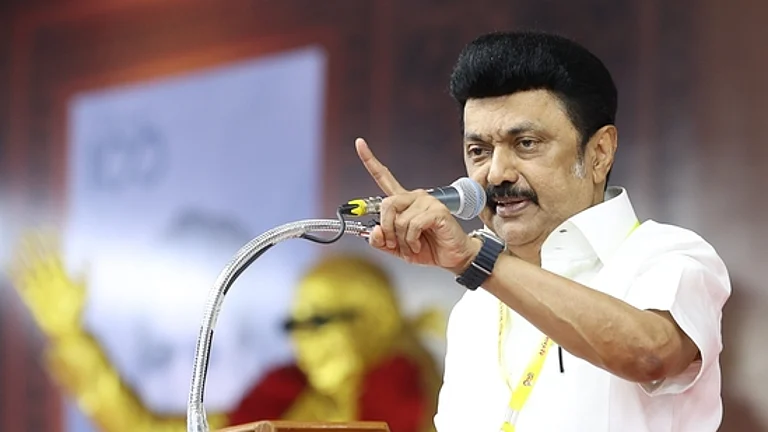A tall, stately woman glides across the foyer of the Sutlej Club in Ludhiana. Her name, Mrs Bector, is instantly recognisable from the labels of bottles of mayonnaise and sauces found in countless Indian larders. Her mild-mannered husband accompanies her; both reciprocate to smiles flashed at them. Everybody in this 500-year-old town seems to know the Bectors—not a mean feat, considering that in terms of well-known businessmen, Ludhiana offers stiff competition—Jagdish Chandra Mahindra, who laid the bedrock of Mahindra & Mahindra here; Brijmohan Lall Munjal of Hero Motocorp, who started manufacturing Hero cycles here and moved on to bikes and more, and Sunil Mittal, who was born here and manufactured bicycle parts long before becoming the celebrated telecom czar.
In a mad rush of multinationals, Mrs Bector’s and Cremica stand out as an Indian challenge. Few people, if any, have not consumed products from the Mrs Bector’s Cremica line. Few would have not savoured their mayonnaise, ketchup or the buns they make for McDonald’s, buttered their English Oven bread or munched into the Oreo biscuits they manufacture for Cadbury’s.
The present owners of the company are guarded about the brand’s exact worth, but experts estimate it to be well above Rs 3,000 crore—a quantum leap from the Rs 300 with which Mrs Bector bought her first hand-churning ice-cream machine in 1978. The ice-cream was to add to Rajni Bector’s elaborate home-cooked menu for the parties the Bectors hosted at their Sarabha Nagar residence. Appreciative friends had then suggested that she start a little catering business.
“In those days, people considered it a disgrace if ladies from ‘good families’ worked outside their homes,” says 75-year-old Rajni. “It was just a hobby for me, and I started to make ice-creams for melas and fetes.”
When Rajni asked for a stall at the Diwali Mela, she was put right next to a Kwality ice-cream vend—the only ice-cream available in Ludhiana then. “It made me uncomfortable and I wondered if I could match up to a known brand,” she says. But the crowd stampeded her stall; soon, the 70-something litres of ice-cream was sold out. The manager of the Kwality stall hopped over for a taste and complimented her. Little did he know that competition from Mrs Bector would force his company to shut shop in Ludhiana—or so claim many. That small success set off Rajni; her ice-creams sold out in every single fete.

Biscuits roll off a production line at a Cremica factory
That was when her husband, Dharamvir Bector—who ran his family fertiliser business—suggested that she install a manufacturing unit. An ice-cream making unit was set up in their backyard in the early 1980s with the Rs 20,000 that Rajni inherited from her mother. “Sometimes, I had to start working 18-hour days. During the day, I was taking care of my home and family and, at night, I would make the ice-creams,” she says.
Soon, customers approached her to cater for parties. One of the orders was for desserts for 2,000 guests at a wedding, with the ice-cream packed in ice and salt.
Dharamvir’s family name of Bector is an anglicised version of ‘Bakhtiyar’. Karachi-born Rajni married him at 17 and settled down as a housewife. Dharamvir inherited the family business of trading in fertilisers and chemicals; he also supplied chemicals to local bakeries. Realising the potential of his wife’s successful ice-cream business, he suggested that they invest in a baking unit. They approached the state financial corporation to borrow Rs 50 lakh, and were told they had to register a company for it and Dharamvir asked his wife to immediately come up with a name.
“I couldn’t think of anything else and said that he could use anything to do with cream since the products are ‘cream ka’ (made from cream),” she laughs. Dharamvir liked it and spelt it as Cremica.
The loan’s approval enabled the Bectors to import a machine from the UK. The bakery unit did as well as the rest of the business. Around 1995, McDonald’s decided to set up their fast food chains in India. They started hunting for the perfect burger bun in India—a difficult task, because there was no mass demand for the buns here. When they were ready to give up, somebody pointed them to Cremica’s Ludhiana baking unit.

Anoop Bector, who heads the biscuits and breads division.
“It wasn’t easy. There were trials for a year, during which we showed them samples and those kept getting rejected. We had a special plant shipped in from the US and managed to master the art. Now, there is a plant each in Noida, Bangalore and Mumbai,” says Dharamvir. The buns require special wheat sourced for the whole year from carefully chosen suppliers in Madhya Pradesh and Rajasthan. The lakhs of tonnes are stored by an American company and ITC.
Along with McDonald’s, another FMCG giant, Quaker, invested around Rs 4 crore in a joint venture with Cremica to make the condiments that would go into McDonald’s products.
“That was another hard task, the product trials lasted long and our American partner’s patience wore out by the time we got it right. In the end, he didn’t want to be here and sold us his share for one US dollar,” Rajni tells Outlook.
By that time, the Bectors’ three sons—Ajay, Akshay and Anoop—had joined the family business. Meanwhile, in the 1980s, Dharamvir’s fertiliser and chemicals business was proving untenable during the insurgency in Punjab. He says how he found it difficult to deal with farmers and had started to incur heavy losses. There was even an attempt to abduct their eldest son. Besides, his wife’s business had taken off. The decision to shut down the family business and join her full time was an obvious one.
The critics have not been unduly hard on them. “Once, Vir Sanghvi wrote that an American brand was the best ketchup you could buy in India. One of my daughters-in-law saw him at a hotel, approached him and pointed out that he had never had Cremica’s tomato ketchup. He later did and gave us a glowing review,” smiles Rajni.
The awards and accolades have also flowed in steadily. Both Captain Amarinder Singh and Parkash Singh Badal gave Rajni awards for being the best entrepreneur in the state. FICCI and other organisations gave her national-level awards. She also received a woman entrepreneur award from president A.P.J. Abdul Kalam. Upon seeing her, the warm ex-president exclaimed, “So you are the ice-cream lady!”
Before her business grew, Rajni gave cooking classes at home for free during the 1980s. When the class expanded to 80-100 students, she started charging them Rs 100 a week to cover the cost of the ingredients. Finally, local colleges engaged her to give cookery lessons at home science classes.
As happens with rapidly-expanding family businesses, the family split up the businesses between the three sons. Ajay and Akshay took over the sauce and condiments business while youngest son Anoop shifted to the biscuits and bread manufacturing.
“My mother ensured a certain quality in her products and we maintain the same standards. When news broke recently that many breads contained potassium bromate, we were reported as one of the few manufacturers who did not use the chemical,” says Anoop Bector.
A decade after their deal with McDonalds, Cremica sold some 21 per cent of its shareholding to Goldman Sachs for around Rs 70 crore in 2006. In 2010, the company wasn’t doing well and Motilal Oswal bought out the shares for Rs 44 crore. Following this, the brothers de-merged the business and Motilal Oswal’s shares were also split accordingly. “Later, Oswal sold their shares at 10 times their original value. They had around Rs 22 crore in Anoop’s company and they got around 10-11 times their investment at Rs 250 crore. Ajay sold his shares and cashed out,” says Dharamvir.
The revenues from the Cremica companies are said to be around Rs 600 crore a year. Cremica Food Industries—owned by Akshay Bector—reports an annual growth of 35-40 per cent and recently raised Rs 100 crore from Rabo Equity Advisers. Anoop’s company is likely to float an IPO in the next two-three years.
The Bectors says that around 40 per cent of their products are exported, though their domestic presence remains concentrated in North India. The fresh funds should help expansion in the south, where some of their products are starting to show up on department store shelves.
So, what does the lady, who has influenced the palates of millions of Indians, like to eat herself?
“I love simple comfort food like ghiya and tinda,” she bursts out laughing. “I love fried food too, but the point is that it must taste good. I have always chased perfection. That is why, whatever new things are made under the Cremica label, production never begins till I give my approval, even though we have retired over the last four-five years.” It is perhaps this simple approach that has enabled the lady who started with a Rs 300 machine to scale national and global heights.
By Ushinor Majumdar in Ludhiana and New Delhi


























